N e w s B r i e f s
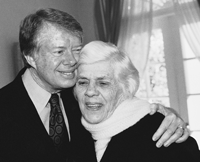
The Lillian Carter Center for International Nursing is a tribute to President Jimmy Carter’s mother, a nurse and Peace Corps volunteer.
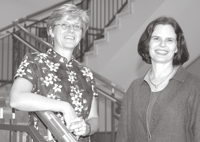
Elizabeth Downes (left) and Kathryn Kite are working with Dean Marla Salmon to extend health care to vulnerable people through the Lillian Carter Center for International Nursing.
Mother,
nurse, social activist
International center bears Lillian Carter’s name
It’s only fitting
that the School of Nursing name its new international nursing center for
Lillian Carter. The late mother of former US President Jimmy Carter helped
support her young family by working as a nurse in Plains, Georgia. Years
later, long after her children were grown, Carter joined the Peace Corps
at age 68 to serve as a nursing volunteer in India.
With the formation of the Lillian Carter Center for International Nursing,
the nursing school is following her example by extending health care to
vulnerable people through nursing practice, education, and research. The
new center will provide training and education for nurses from the United
States and other countries, exchanges for faculty and students, and forums
on the global nursing workforce. Come fall, the center will be dedicated
during its first conference on global nursing partnerships at The Carter
Center.
The Lillian Carter Center for International Nursing is actually the convergence
of a former dean who spearheaded the school’s first international
nursing efforts and a current dean with a similar passion.
Like Lillian Carter, former Dean Ada Fort was concerned that people around
the world lacked access to basic health care and in 1972 founded the International
Nursing Services Association. Known today as Global Health Action, the
organization is located near the Emory campus and has trained more than
5,000 health care professionals from more than 70 developing countries.
When Marla Salmon became nursing dean two years ago, she brought with
her the idea of forming a center focused on international nursing and
global workforce issues. “It was a logical extension of my own experience
and Emory’s special relationship with The Carter Center,” says
Salmon, who directs the Lillian Carter Center. “All these things
gave rise to the notion of an international nursing center named for President
Carter’s mother.”
Two leaders have joined Salmon at the center’s helm. Assistant Professor
Elizabeth Downes has rejoined the nursing school as academic program coordinator
for the Lillian Carter Center. Working with her is administrative director
Kathryn Kite, who coordinates the center’s operations and development,
based on 17 years of experience with the Southern Center for International
Studies in Atlanta. Kite has broad experience in convening international
panels (such as those with ministers of health) and developing international
education videos and television materials that will help make the school’s
dreams for an international nursing center a reality.
Downes returned to the United States this year after serving as an affiliate
faculty member and World Health Organization consultant in Fiji, where
she developed a nurse practitioner program for the region. Thus far, Downes
has helped facilitate an upcoming student trip to Cuba, served on the
curriculum committee for a new graduate major in international nursing
and public health, and prepared for the upcoming conference in October.
Having also worked in Zimbabwe, Benin, and Mozambique, she knows what
it’s like for nurses who practice in developing countries.
“It’s amazing to see the conditions under which some nurses
work,” says Downes. “They are my heroes. I want to make sure
these nurses are better trained and their working conditions are improved
so it becomes easier for them to provide excellent health care.”
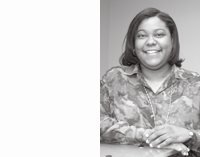
Chrystal Jefferson is the school’s first assistant director of financial aid.
A
New Voice for Students
Jefferson assumes
new financial aid position
If the School of Nursing
continues to have its way, the cost of earning a nursing degree will never
be a barrier for students. Fortunately, they have a new ally in making
their education affordable. As the school’s first assistant director
of financial aid, Chrystal Jefferson has 10 years of financial aid experience,
most recently at the Emory University financial aid office.
In her new role, Jefferson assists undergraduate and graduate nursing
students and serves as the liaison between the nursing school and the
main financial aid office. While the nursing school offers several options
for scholarships, grants, and student loans, Jefferson is determined to
find creative ways to help finance and reduce the cost of a nursing education.
“One of my biggest concerns is the level of indebtedness of our students,”
she says. “I want to focus on finding innovative ways of financing
their tuition so undergraduates don’t come out of nursing school
with $20,000 worth of debt for just two years. That debt can be quite
a challenge for nursing students who are just out of college and who may
also be supporting a family.”
One new option that Jefferson can offer is CHANCES (Children’s Healthcare
of Atlanta: Nursing Commitment to Employment and Study). CHANCES covers
60% of tuition for nursing undergraduates who agree to work for Children’s
Healthcare for three years after they graduate. CHANCES is patterned after
the successful NEAT (Nursing Employment and Tuition Award) program, offered
by Emory and Crawford Long hospitals. Jefferson sees more new financial
aid options for students on the horizon.
“The nursing school is committed to helping students meet the cost
of education,” Jefferson says. “Our dean is constantly looking
for new financial sources for students and new alliances for accomplishing
that. She wants to use her resources in ways that directly impact students.
That makes my job easier. I want to make a difference.”
Nursing school now 20th in NIH funding
It’s been a very good year for nursing researchers at Emory. New rankings released by the National Institutes of Health (NIH) show the School of Nursing has jumped from 37th to 20th in the nation, based on NIH research funding awarded to the school for FY 2000.
The criteria for the ranking, which puts the nursing school just above Columbia University (21st) and just below the University of Maryland (19th), excludes NIH training grants. “It’s based on real dollars—funded research that shows you’re doing a wonderful job, your school is doing a wonderful job, and your dean is doing a wonderful job,” Emory President William Chace told the faculty during a recent celebration. “You’re making a tremendous place for us in nursing research.”
Dean Marla Salmon also had high praise for faculty. “Your scholarship is attracting outstanding doctoral students and postdoctoral fellows as well as building distinguished partnerships with others in the health sciences at Emory,” she said. “We’re excited about the scientific challenges and scholarly endeavors that these teams will initiate in the future.”
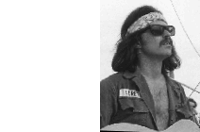
Singer Country Joe McDonald has great reverence for nurses who served in Vietnam.
The
Social Contract to Care
A
rock singer and nursing pioneer unite in spirit
What do 1960s folk/rock
singer Country Joe McDonald and Florence Nightingale have in common? For
one, School of Nursing Dean Marla Salmon is among their biggest fans.
And both people have contributed to nursing’s social responsibility
to care.
In Nightingale’s era, systematic training, expert knowledge, and
evidence-based practice were hallmarks of her training school for nurses.
In the process, she elevated nursing to a high level of professionalism
in promoting and protecting health in the 19th century.
“She created a profession with a strong tradition of ethics,”
said Salmon during the Great Teachers Lecture series at Emory this spring.
A songwriter during the Vietnam era, McDonald revered nurses in a similar
but contemporary light. “Lady and the Lamp,” his song about
nurses who served in Vietnam, describes them as romantic angels in the
midst of a terrible human event. That same image applies to Nightingale,
whose life was shaped by the Crimean War. “That experience had a
profound impact on her notion of how you care,” said Salmon. “You
couldn’t do it unless you were linked to those who were suffering.”
Because of Nightingale, nursing earned the public’s trust and respect.
It also became a proper option for women who wanted to work. By the 1950s,
the health care context had evolved into the traditional doctor/nurse/patient
triad. That changed rapidly in the late 1980s as health care became driven
by the marketplace and technology. “Nurses still had an ethical obligation
to care in the context of patient, family, community, and society,”
Salmon said. “But technology itself is very demanding of care. Managing
resources and staff in today’s environment is a huge challenge. So
the context has become a competition for caring.”
To compound matters, society has paid little attention to the profession
amid the current nursing shortage and the rapid advances in health care.
“Part of society’s responsibility is to make sure that the context
actually allows for caring to take place,” said Salmon. “You’re
looking at quality issues in the health system, but you’re also looking
at the profession in the face of 43 to 44 million people in this country
who don’t have access to care. It’s a very challenging context.”
But what can society do? During World War II, the nation galvanized its
resources to train 186,000 military nurses in four years. Half a century
later, a new vehicle for social action has emerged. “Technology is
a powerful force in our society, and we’re now able to help people
learn more, know more, understand more, and potentially take more directed
action,” said Salmon.
Consider Country Joe McDonald, whose website includes a tribute to Florence
Nightingale. “He became very aware of the role nurses had played,
particularly in Vietnam, and was concerned that society didn’t understand
how important caring was,” said Salmon. “Through his website,
you see that this individual has found a way to touch everyone in some
way and encourage them to optimize their ability to care. One person can
make a difference.”
Salmon then challenged the audience to consider and act upon their part
of the contract to care in order for the nurse–public partnership
to flourish and care for society.
To view Country Joe McDonald’s website on Florence Nightingale,
go to www.countryjoe.com/nightingale/.
A
Plus for Women’s Health
The School of Nursing now offers a Women’s Health Nurse Practitioner (WHNP) program to prepare nurses to deliver primary care to women throughout their lives, with an emphasis on reproductive-gynecological health. Students will gain clinical experience in a variety of settings, including rural and underserved areas. Graduates who complete the yearlong MSN program will be eligible for national certification as a WHNP. For more information, visit the website at www.nursing.emory.edu/Admissions/MSN/WomenHealth.htm.
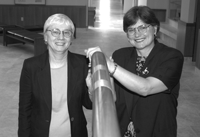
Dean Marla Salmon (right) nominated Annette Frauman for the Charles R. Hatcher Jr. Award for Excellence in Public Health. They are shown at the bottom of the grand stairway in the School of Nursing.
A
Year of Surprises
Frauman
receives three top honors
This spring has been
full of professional surprises for Associate Professor Annette Frauman.
In June, she received the Charles R. Hatcher Jr. Award for Excellence
in Public Health, presented each year to a public health leader in the
Woodruff Health Sciences Center on behalf of Hatcher, who guided the center
for many years.
The award recognizes Frauman for many accomplishments in the public health
arena, including establishment of the graduate program in public health
nursing leadership last year. Because of her efforts, the School of Nursing
enjoys a close working relationship with Georgia’s public health
nursing office and was successful in winning a federal contract to pilot
and evaluate an educational program for the state’s public health
nurses. In the process, Frauman formed strong partnerships with the Rollins
School of Public Health, the Health Resources and Services Administration,
the Centers for Disease Control and Prevention, and the public health
nursing community in Georgia. She also helped establish a collaborative
group of institutions to look at education and policy issues related to
school health.
Frauman was nothing short of overwhelmed when she received two additional
honors during the American Nephrology Nurses’ Association (ANNA)
annual meeting in April. In addition to receiving the Outstanding Contribution
to the ANNA Award, she learned that the group had established the Annette
Frauman Scholarship for Advanced Practice Education in nephrology nursing.
The $5,000 annual scholarship is sponsored by Biolink Corporation, which
manufacturers the Dialock dialysis port. Frauman has worked in pediatric
nephrology for many years and currently is conducting a study to help
children with end-stage renal disease become more independent.
Ode
to Research
Parker
recognized for nephrology studies
Associate Professor Kathy Parker received a top research award at the
spring annual meeting of the American Nephrology Nurses’ Association
(ANNA) in Las Vegas. The ANNA Research Award recognizes Parker for nearly
30 years of clinical study involving dialysis patients. Her latest research
focuses on the effects of hemodialysis on the sleep/wake cycle.
Parker captured another fitting prize last fall. A poem that she penned
won the poetry category during Health Sciences Research Appreciation Day
at Emory. The title of her winning entry: “Ode to Uremic Rat One.”
Ode
to Uremic Rat One
This ode is in honor of Uremic Rat One
Who gave us his all before it was done.
We needed to take a close look at his brain
And hoped that some data we would obtain.
‘Cause my patients can’t sleep and I just don’t know why
And we wanted to help so we gave this a try.
The results of this work can be quite simply stated.
Dopamine transporter was upregulated.
It seems when the level of this substance increases
The transmitter available in the synapse decreases.
The cause of this change is not crystal clear
But its effect on sleep can be quite severe.
Is this finding for real? We’ll just wait and see
And continue our work with Rat Two and Rat Three.
So Uremic Rat One may you rest in peace.
Our honor of you will just never cease.
—Kathy Parker, September 1999
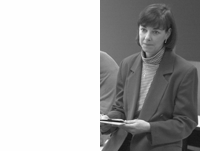
Deborah Ryan is working on a project that will enhance the school’s reputation as a leader in nursing education.
A
Distinguished Feather in Her Cap
Ryan
is creating model for adjunct faculty
Associate Professor
Deborah Ryan has added another honor to her list of teaching accomplishments.
As the School of Nursing’s first Distinguished Teaching Professor,
Ryan has received financial support and some release time for the next
three years to develop projects that will enhance the nursing school’s
reputation as a leader in education.
Among her goals is creating a model to recruit, orient, and support adjunct
nursing faculty. In recent years, hiring part-time faculty has stirred
up national debate among schools about quality of teaching. While such
concern is valid, Ryan believes that integrating adjunct faculty more
fully into the nursing school will benefit students and strengthen teaching.
“Hiring adjunct faculty is a reality we must learn to live with,”
she explains. “There is a critical shortage of nurses and nursing
faculty, and the cost of hiring full-time faculty is high. Developing
a pool of qualified adjunct faculty can help relieve that shortage. Most
of our adjunct faculty are clinically based and often teach in the hospital.
It’s important for them to feel they are part of the school and for
students to interact with them outside the clinical setting.”
Ryan is compiling a manual to help orient part-time faculty and broaden
their understanding of how the courses they teach fit into the curriculum.
In the long run, she proposes that adjunct faculty be hired for a larger
percentage of their time so they can participate in school activities.
“As Emory moves toward becoming a nursing school ranked in the top
tier of nursing programs, the quality of teaching and our ability to find
solutions to the challenges we face are critical to our success,”
says Ryan. “With this project, we are taking the lead in designing
a model that addresses our needs for the future.”
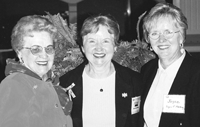
New
Beginnings
The Nell Hodgson Woodruff School of Nursing hosted a reception this spring for Fran Wenger (center), a former faculty member, during a meeting of the Transcultural Nursing Society. Friends and colleagues gathered to wish Wenger well on her retirement from the Interfaith Health Program in the Rollins School of Public Health. Among the guests were Madeleine Leininger (left), founder of the Transcultural Nursing Society, and Joyce Murray, professor of nursing.
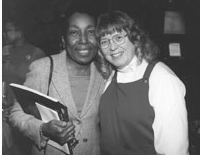
Maggie
Gilead (left) gets a hug
from nursing school staff member
Di Shelburne.
Kudos
for Community Service
Gilead’s
work touches the lives of mental health patients
A School of Nursing faculty member is one of the 2001 recipients of the Martin Luther King Jr. Community Service Award at Emory. Maggie Gilead, associate professor in adult and elder health, has long advocated for improving mental health services at the local and state levels. As a member of the DeKalb County Community Mental Health Board, Gilead was part of the statewide effort to implement House Bill 100, which improved availability of services for mental health patients and restructured Georgia’s community mental health system. She currently serves on Governor Roy Barnes’ Mental Health Planning and Advisory Council and works with sickle cell patients at Crawford Long Hospital.